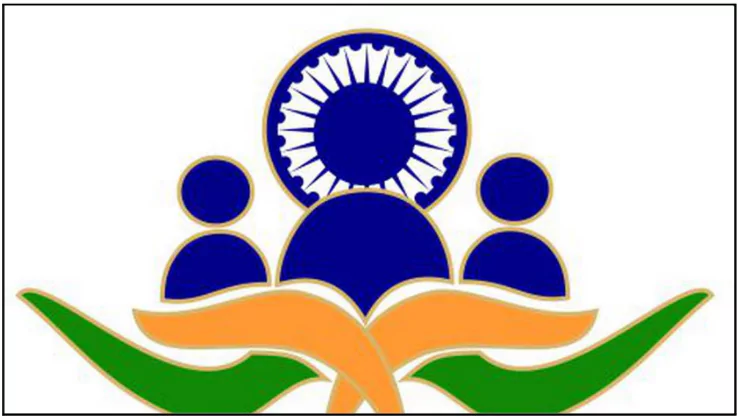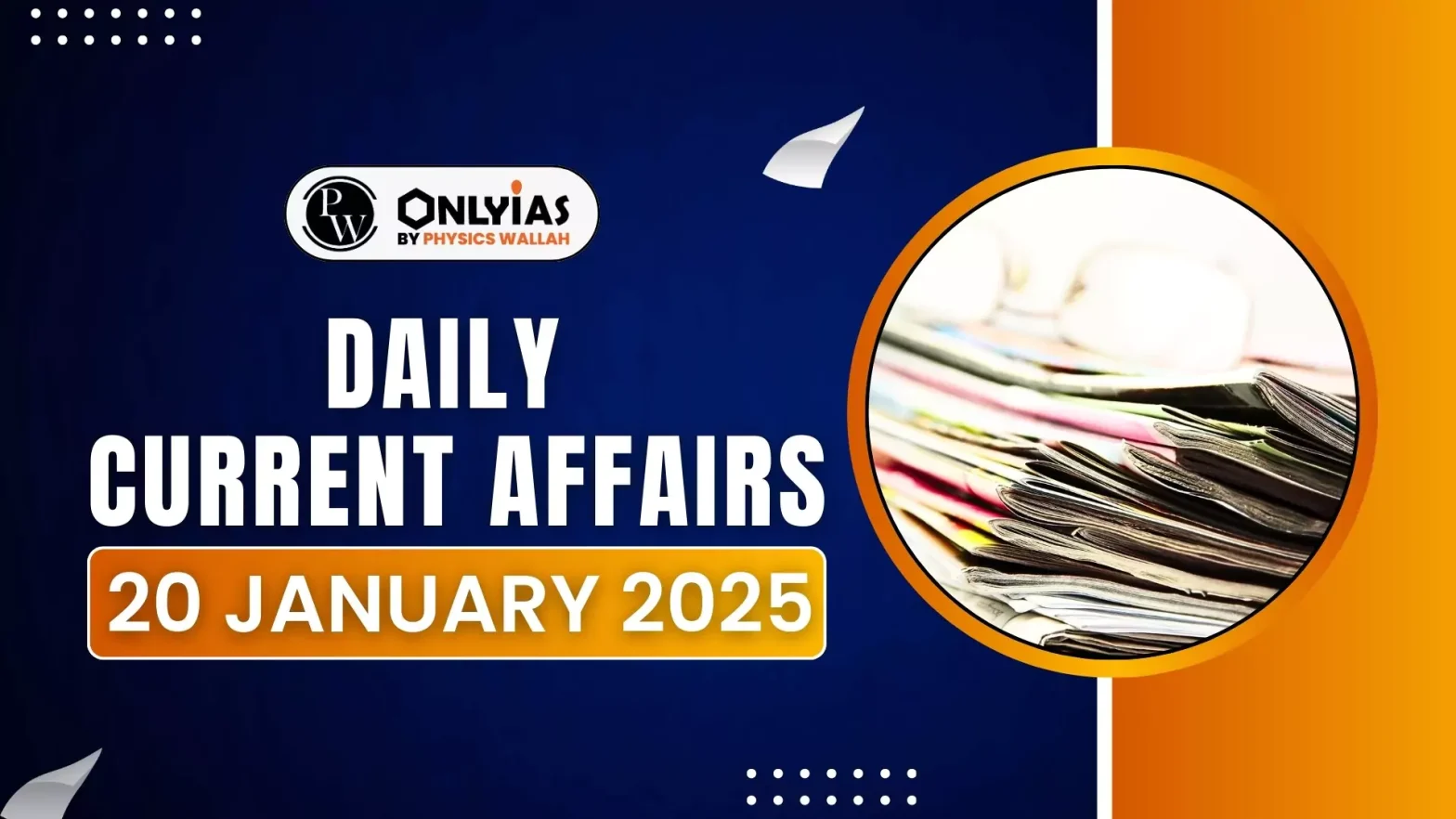The Foundation Day of the Lokpal of India was held for the first time on 16th January at Manekshaw Centre, New Delhi.
- The Lokpal of India was established by the Lokpal and Lokayuktas Act, 2013, on 16th January 2014.
- The Chief Guest of the programme was the Chief Justice of India Shri Justice Sanjiv Khanna.
About Lokpal

- The Lokpal is a national-level anti-corruption institution established to investigate and prosecute corruption cases involving public officials.
- It serves as an independent body to ensure accountability among ministers and government employees.
- It is a statutory body without any constitutional status.
- Establishment: The Lokpal and Lokayukta Act, passed in 2013, came into force in 2014.
- However, the first Lokpal, Justice Pinaki Chandra Ghosh, was appointed only in 2019 after a delay of nearly five years.
- The Act also mandates the establishment of Lokayuktas at the state level.
Enroll now for UPSC Online Course
Timeline of the Establishment of the Lokpal
|
| 1966 |
The First Administrative Reforms Commission recommended the creation of a two-tier machinery consisting of Lokpal and Lokayuktas to redress public grievances. |
| 1968 |
Lokpal and Lokayuktas Bill was first presented in the Fourth Lok Sabha. |
| 2002 |
The National Commission to Review the Working of the Constitution recommended constitutional provisions for the appointment of Lokpal and Lokayuktas. |
| 2005 |
The second ARC chaired by Veerappa Moily recommended that the office of Lokpal be established without delay. |
| 2011 |
A Group of Ministers, chaired by Pranab Mukherjee was formed to suggest measures to tackle corruption and examine the proposal of a Lokpal Bill. |
| 2011 |
India ratified the United Nations Convention Against Corruption (UNCAC) by depositing the instrument of ratification. |
| 2011 |
The Lokpal Bill was introduced in the Lok Sabha for the first time in this form. |
| 2013 |
Lokpal and Lokayuktas Bill, 2013, was passed in both Houses of Parliament. |
| 1st January 2014 |
The Bill received assent from the President of India. |
| 16th January 2014 |
The Lokpal Act finally came into force. |
| 2016 |
Lokpal and Lokayuktas Act 2013 was amended. |
Need for Lokpal
- Prevalence of Corruption in India: India has long struggled with corruption at both state and central levels.
- In 2023 India ranked 93rd out of 180 countries in the Corruption Perceptions Index.
- Lack of Effective Investigation and Prosecution: Existing mechanisms like the CBI and CVC have often been accused of inefficiency and political interference.
- In the past even the CBI has been termed as a “caged parrot” and “its master’s voice” by the Supreme Court of India.
- Lack of Internal Transparency and Accountability in Anti-Corruption Agencies: There is no effective and separate mechanism to maintain checks on agencies like CBI and CVC.
- An independent institution of Lokpal and Lokayukta has been a landmark move which can offer a solution to the never-ending menace of corruption.
- These institutions provide a powerful and effective measure to counter corruption at all levels of the government.
Key provisions of the Lokpal Act
- Composition:
- Lokpal is composed of a chairperson and a maximum of eight members, with half of them being judicial members.
- At least a half of members should belong to Scheduled Castes, Scheduled Tribes, Other Backward Classes, minorities, and women.Selection Committee:
- The Selection Committee includes the Prime Minister as Chairperson, Speaker of Lok Sabha, Leader of Opposition in Lok Sabha (or the leader of largest opposition party in Lok sabha), Chief Justice of India or a Judge nominated by him/her and one eminent jurist appointed by the President.
Check Out UPSC CSE Books From PW Store
Lokpal and Lokayuktas (Amendment) Act, 2016:
- The Act amended the Lokpal and Lokayuktas Act, 2013 in relation to declaration of assets and liabilities by public servants.
- It requires a public servant to declare his assets and liabilities, and that of his spouse and dependent children.
- Such declarations must be made to the competent authority within 30 days of entering office.
|
- Jurisdiction:
- Over Prime Minister, Union Ministers, Members of Parliament and Groups A, B, C and D officers and officials of the Central Government.
- Superintendence: It has the power of superintendence and directs any investigative agency, including the Central Bureau of Investigation, Central and Central Vigilance Commission, for cases referred to it by the Lokpal.
Ombudsman around the world
Sweden
- The earliest ombudsman in the modern world was established in Sweden in 1809, to oversee the government administration.
Finland
- The principal ombudsman institution in Finland has been in existence since 1920.
- It oversees the legality of actions taken by the authorities, primarily by investigating complaints received, without any cost to the complainant.
Denmark
- The Folketingets Ombudsman, or the Danish Parliamentary Ombudsman was first established in 1955 to investigate complaints about public administration.
Norway
- The Norwegian Parliamentary Ombudsman, is appointed by the Storting, its Parliament, to protect the rights of individuals and to prevent torture and inhuman treatment.
Netherlands
- The Constitution of the Netherlands mandates the appointment of Nationale Ombudsman since 1981.
- It refers, mediates or investigates the complaints received against government malpractices.
New Zealand
- Since 1962, the Office of the Ombudsman of New Zealand has acted as an independent authority, helping the community in its dealings with government agencies.
- It engages in protecting the rights of individuals, such as the disabled community, whistle-blowers, detained individuals, etc
|
Check Out UPSC NCERT Textbooks From PW Store
Powers and functions of the Lokpal
- Jurisdiction:
- Prime Minister: The Lokpal’s jurisdiction includes the Prime Minister, except for cases related to:
- International relations, National security, Public order, Atomic energy and Space
- Ministers and Members of Parliament (MPs): Lokpal can investigate allegations of corruption but not actions or statements made in Parliament or votes cast by MPs.
- Group A, B, C, and D officers and officials of the Central Government.
- Superintendence and Oversight Powers:
- Control over the Central Bureau of Investigation (CBI):
- Lokpal has superintendence over the CBI for cases referred by it.
- The CBI investigating officer in such cases cannot be transferred without Lokpal’s approval.
- Inquiry Wing: The Inquiry Wing of the Lokpal has been vested with the powers of a civil court.
- Confiscation Powers: Lokpal can order the confiscation of assets, proceeds, or benefits obtained through corrupt means in special circumstances.
- Powers to Ensure Integrity of Proceedings:
- Can recommend the transfer or suspension of public servants involved in corruption allegations.
- Empowered to give directions to prevent the destruction of records during preliminary inquiries.
- Asset Disclosure: The Lokpal Act mandates public officials to disclose the assets and liabilities of themselves and their dependents.
- Advisory and Preventive Role: Lokpal can recommend measures to curb corruption and suggest administrative reforms for better governance.
Challenges and Issues with the Lokpal
- Delayed Appointment: First Lokpal was appointed five years after the Act’s implementation.
- Despite the Act being passed in 2013, the first Lokpal Chairperson, Justice Pinaki Chandra Ghosh, was appointed in 2019.
- The position of Chairperson also remained vacant from May 2022 until March 2024..
- Political Interference: The selection process of Lokpal involves political figures, such as the Prime Minister and the Leader of the Opposition.
- Jurisdictional Limitations:
- The Prime Minister, while being under the purview of the Lokpal, is protected from investigation in matters related to national security, foreign affairs, and atomic energy.
- The Lokpal cannot investigate corruption at the state level, leaving a significant gap in addressing corruption in state administrations.
- Anonymous complaints not allowed: The Lokpal Act does not permit anonymous complaints, which may deter potential whistleblowers from coming forward.
- High Rate of Disposal Without Action: According to a Parliamentary panel report, Lokpal disposed of 68% corruption complaints against public servants without any action.
- Limited Power to Enforce Action: The Lokpal has no direct investigative powers. It relies heavily on the CBI and the CVC for investigation and action.
- Out of 8,703 complaints received between 2019-23, only three were fully investigated.
- Limitations in Complaint Processing:
- Nearly 90% of complaints have been rejected over the past five years due to submission in incorrect formats.
- Complaints must be filed within seven years of the alleged offence, further restricting the scope of investigations.
- Low Productivity of Lokpal: Only 24 investigations ordered and six prosecution sanctions granted since its establishment.
- Resource Constraints: The Lokpal has faced issues related to understaffing and insufficient resources, which impacts its ability to handle the high volume of cases.
- Inadequate Transparency: The Lokpal’s functioning has been criticized for a lack of transparency in its processes.
- Weak Whistleblower Protection: The Lokpal Act prescribes protection for whistleblowers, but in practice, there are significant loopholes in the protection mechanism.
Way Forward
- Timely Appointment of the Lokpal and Members: Amend the Lokpal Act to introduce clear deadlines for the constitution of the selection committee and final appointments.
- Minimizing Political Interference: Introduce mechanisms to reduce political influence in the appointment of Lokpal members, such as increasing the weightage of judicial and independent members in the selection committee.
- Expanding Jurisdiction: Reassess the limitations on investigating the Prime Minister, ensuring safeguards for national security without diluting accountability.
- Enhancing Investigative Powers: Grant the Lokpal direct investigative powers to reduce dependence on agencies like the CBI and CVC.
- Strengthening Resources and Infrastructure: Increase budgetary allocation for the Lokpal to ensure adequate staffing, technology, and infrastructure.
- Improving Transparency: Make the Lokpal’s processes more transparent by publishing annual reports, details of ongoing investigations, and the status of resolved cases.
- Strengthening Whistleblower Protection: Amend the Lokpal Act to provide more protection for whistleblowers, including anonymity and legal safeguards.
Enroll now for UPSC Online Classes
Lokayukta
- Like Lokpal, Lokayukta is an anti-corruption ombudsman at the state level.
- It investigates corruption and misconduct involving state government officials, including the Chief Minister, state ministers, and other state-level public servants.
- The Lokayukta is appointed by the Governor of the state.
Issues Related to Lokayukta:
- No Clear Legislation:
- The Lokpal and Lokayuktas Act 2013 only has one section on Lokayukta, which mandates that states must pass the Lokayukta Act within one year.
- There is no information about the composition, powers, or other functions of Lokayukta.
- Funding: The Lokayukta is dependent on the state government for funding and infrastructure.
|
![]() 20 Jan 2025
20 Jan 2025

